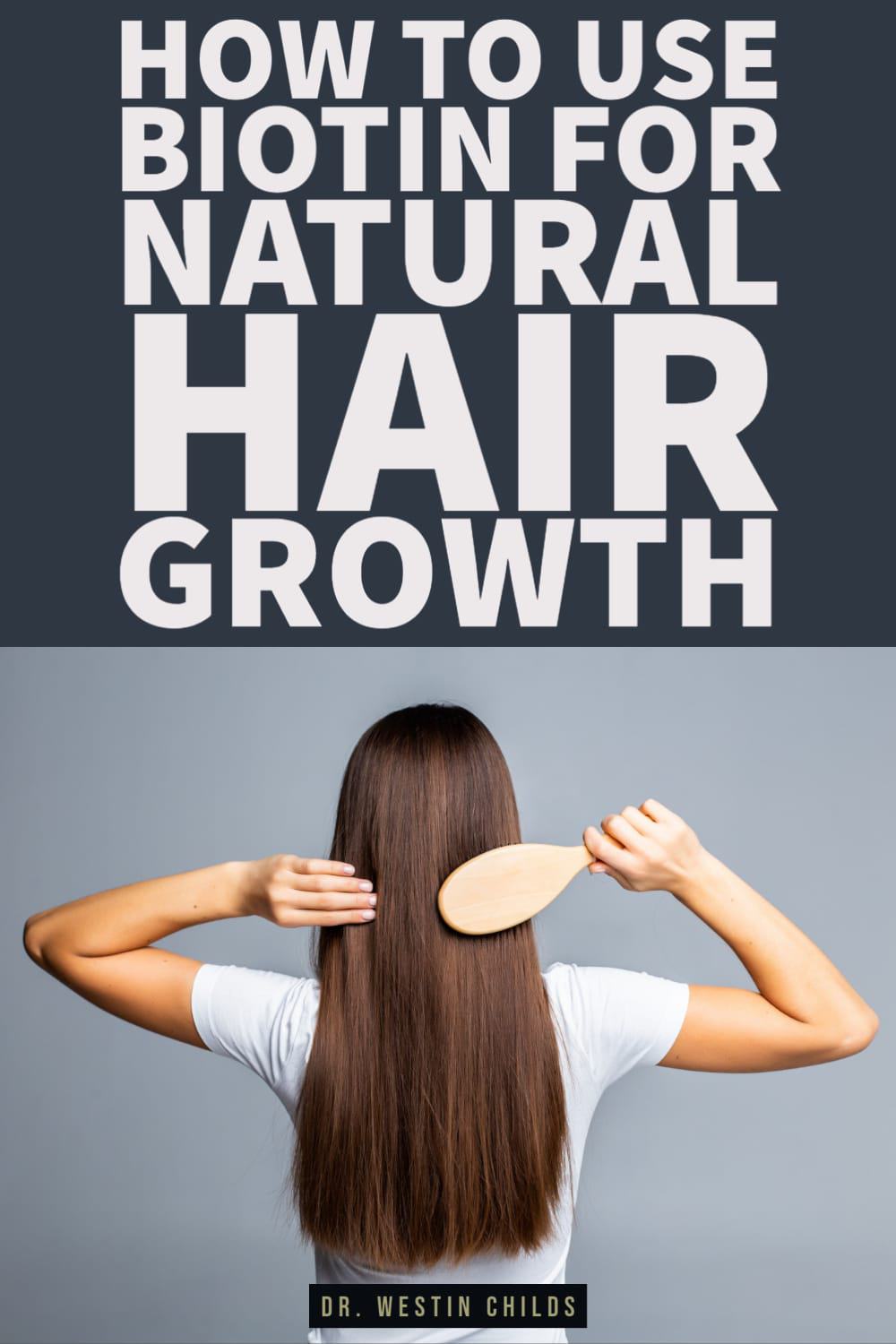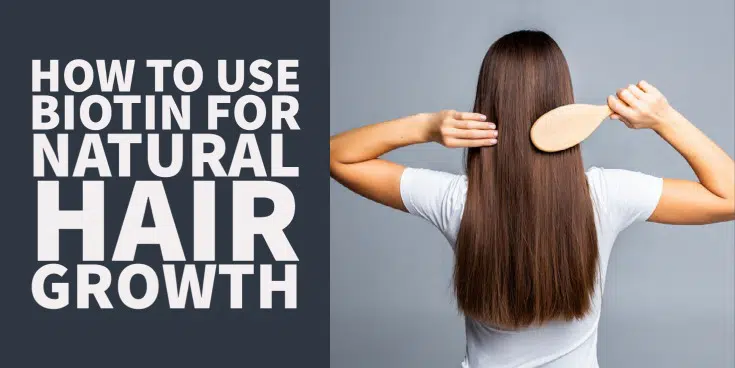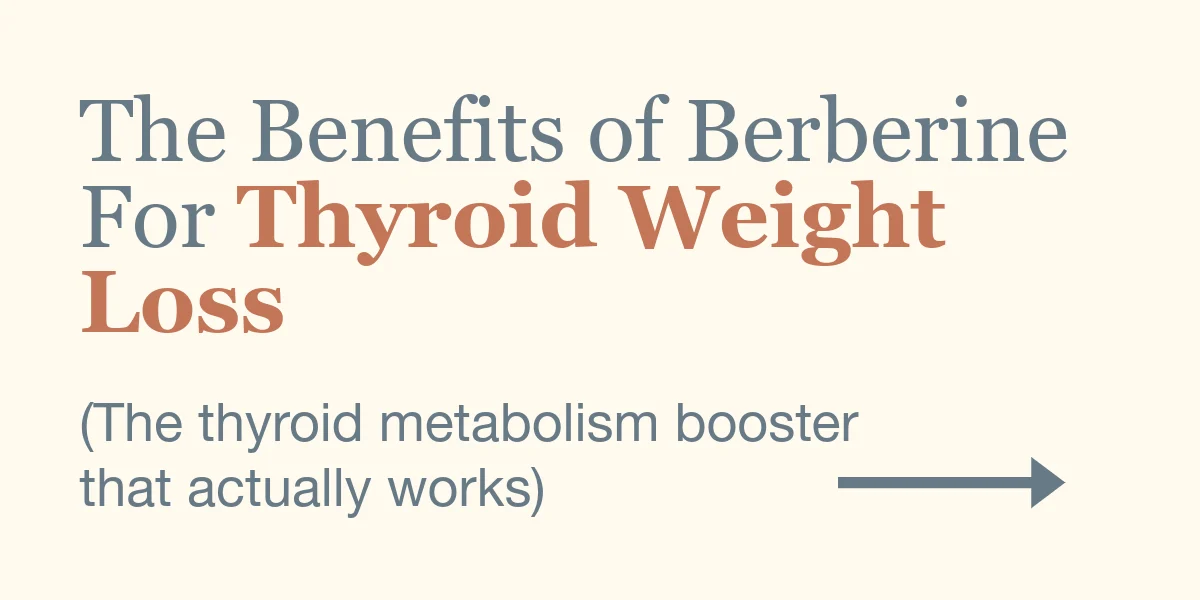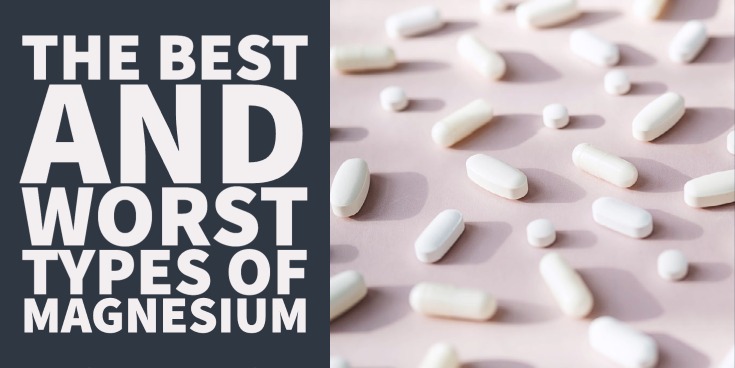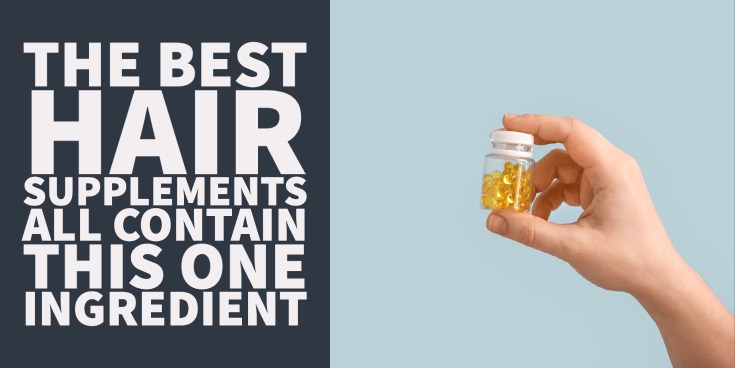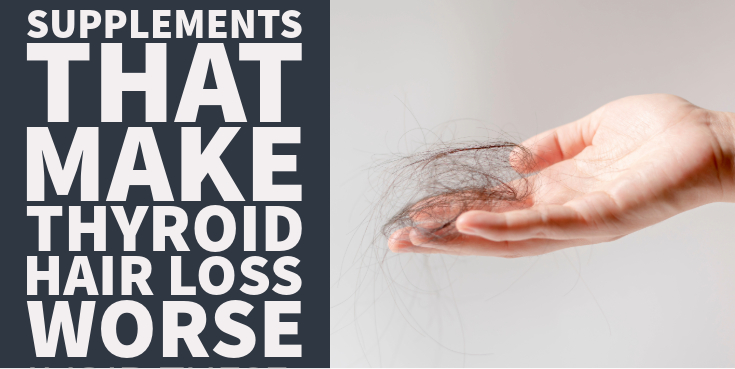Biotin is a special nutrient that may help curb hair loss.
The catch?
It must be used appropriately, in the right people, at the right dose, and for the right length of time.
Clinical studies have shown that daily use of biotin does indeed improve hair strength probably through its powerful effects on the protein keratin.
This effect helps improve the structural integrity of both your skin and your hair.
But does that mean you should start supplementing?
Let’s find out…
Learn more about using biotin for hair growth in this post:
Does Biotin Actually Work for Hair Loss?
Will taking biotin actually help you regrow your hair?
Actually, yes, it just might.
Biotin is a special co-enzyme that is involved in various metabolic reactions ranging from fatty acid synthesis to amino acid catabolism.
In addition, it has been shown to be critical to the maintenance of healthy skin and hair.
Believe it or not, researchers don’t really know how exactly biotin is involved in either but they believe it has to do with the fact that taking biotin has been shown to strengthen the protein keratin and keratin is the basic building block for hair, skin, and nails.
So now that we know that taking biotin can actually improve hair loss does that mean that you should use it?
That’s a different story.
While studies have certainly shown that taking biotin can regrow hair, it seems that the people who benefit the most from taking biotin are the ones who are deficient in this nutrient.
Studies have shown (1) that up to 38% of women who complain of hair loss actually have suboptimal (or low) biotin levels that may be contributing to their hair loss.
Why not 100%?
Well, many conditions cause hair loss and we will go over those a little bit later.
So how do you know if taking Biotin will help with your hair loss?
People who tend to have low biotin levels often have several risk factors:
Who is at risk for having low Biotin levels (2)?
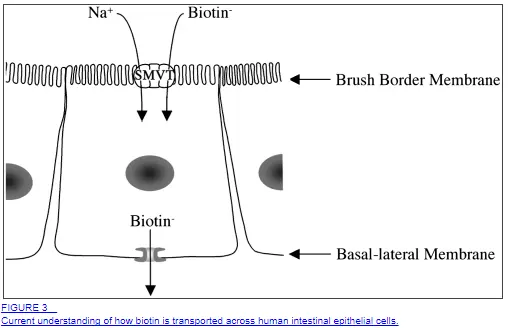
Those with gastrointestinal issues (Celiac disease (3), non-Celiac gluten sensitivity, SIBO, IBS, IBD, chronic constipation/diarrhea, etc.), people with a history of repeated antibiotic use (especially for GI conditions, skin conditions such as acne or chronic sinus infections), and those taking certain medications (like anti-seizure medications).
These conditions result in changes to both the absorption and the metabolism of biotin in the body.
If you have trouble absorbing biotin then obviously you will have low levels, but likewise, if you have issues in metabolizing it (meaning your body can’t use it properly) then you will also suffer.
People with biotin deficiency also often present with other symptoms (4) such as alopecia, dermatitis (Seborrheic-like), depression, and even numbness/tingling.
If you have any of the risk factors listed above AND you are suffering from hair loss then there is a good chance that taking biotin may reduce your hair loss and even help with hair growth.
The key to using biotin really has more to do with HOW you take it (including how much you take and for how long you use it).
Before we talk about how to use it for best results let’s briefly discuss other causes of hair loss that may limit the benefits of taking biotin.
What Really Causes Hair Loss
We know that biotin helps with hair loss but does that mean it will help everyone?
Not necessarily.
When we talk about treating hair loss it’s very important to understand that MANY conditions and diseases can cause hair loss.
I bring this up because you need to know that taking Biotin won’t help with every single condition out there.

You can also use this as a brief guide to help you figure out what is at the root cause of your hair loss.
The top 3 causes of hair loss in both men and women:
#1. Sub-optimal Nutrient status
This is probably the #1 most common cause of hair loss in both men and women.
This section is also the most important because it’s frequently missed by physicians.
Most conventional physicians are great at prescribing medications, but they lack a basic understanding of how to use nutrients and vitamins correctly.
Because of this many patients may walk around with so-called “normal” nutrient levels, when in reality they are actually suboptimal.
For instance:
Studies have shown that women need at least a ferritin level of 30ng/mL (5) for proper hair growth.
But the conventional lab reference ranges show that you can still be “normal” with a ferritin as low as 10 ng/mL!

The moral of the story?
You can’t always trust the standard and conventional reference ranges if you are suffering from hair loss.
Beyond iron (and ferritin), you also need adequate levels of biotin, B vitamins, amino acids, and other minerals (6) (selenium and zinc) in order for hair growth.
If you have suboptimal levels (this doesn’t mean an overt deficiency) then taking these supplements WILL help with hair growth.
This is one of the reasons that women often report an increase in hair growth once they start taking prenatal vitamins.
Why?
Because prenatal vitamins contain iron!
#2. Hypothyroidism
Another very common reason for hair loss among women is hypothyroidism.
Hypothyroidism refers to low levels of circulating thyroid hormone and is often identified with a slight increase in the TSH concentration in the serum.
Recently some studies suggest (7) that a TSH level of < 2.5 is normal, despite the standard reference range which defines normal function anywhere between 0.350 to 5.500 uIU/mL.

If you have hypothyroidism (up to 15-20% of women in the US do) then it will be necessary to fix this problem if you want your hair to grow back.
Hypothyroidism is also complicated by the fact that it can cause nutrient deficiencies as well.
You can learn more about how to evaluate TSH levels and how to improve hair growth if you suffer from hypothyroidism here.
#3. Excess androgens (testosterone & DHEA) in conditions such as PCOS
Next on the list is hair loss caused by changes to androgen levels in the body.
Women who suffer from conditions such as insulin resistance or PCOS often suffer from hair loss which mimics the male pattern (8) of hair loss.
Women who experience male patterned baldness (and even excessive facial hair growth) need to address these testosterone levels in order to reverse hair loss.
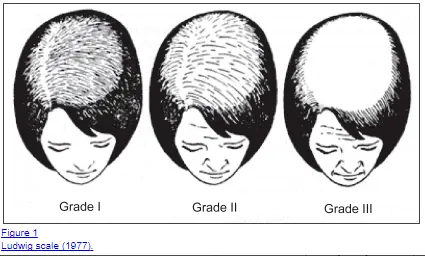
Remember!
Hair loss in most women is not caused by one single problem.
Instead, several conditions may be contributing which makes the problem both difficult to diagnose and treat.
For instance:
Those with hypothyroidism tend to have hair loss as one of their main symptoms.
Hypothyroidism ALSO tends to cause iron deficiency and deficiency in other nutrients such as B vitamins (up to 50% of hypothyroid patients are also vitamin B12 deficient).
In this case, hair loss may be caused by 2 separate conditions: iron deficiency and hypothyroidism.
The trick here is that giving this person thyroid replacement medication won’t fix the iron deficiency problem – for that problem the patient would need to also take iron.
See how that works?
So the bottom line is this:
If you take biotin (and other nutrients) and notice SOME increase in hair growth, but not all, then you should start looking for other conditions which may also be contributing.
Combining Therapies for Hair Loss
Because hair loss tends to be multifactorial (meaning multiple conditions tend to contribute to hair loss), it’s best to take an approach that includes more than just 1 therapy.
Biotin is great for hair loss, don’t get me wrong, but it can be insufficient by itself.
This may explain why so many women get variable results when they take biotin supplements for hair loss all by themselves.
The combination of biotin plus silica plus choline tends to get far superior results than just biotin alone.
This has been confirmed in clinical studies (9):
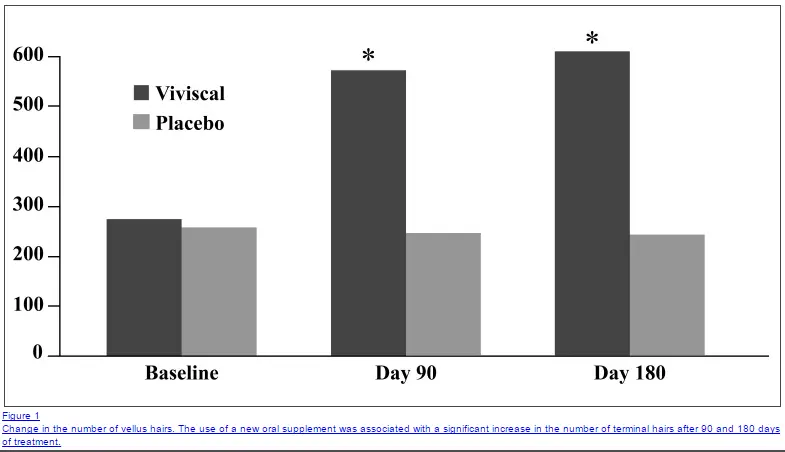
Why this occurs is not exactly understood, but it most likely has to do with the synergistic effect that nutrients tend to have on one another.
The easiest way to explain this phenomenon is this way:
When you eat foods that contain nutrients you will ALWAYS get several different types and doses of nutrients.
There is no such thing as a food that contains ONLY biotin or ONLY iron.
Instead, food often contains a blend of nutrients in various quantities and it may be the specific set of nutrients (and their dose) that really bring on the best effects.
It’s also worth pointing out that taking excessively high doses of biotin (without other nutrients) can actually make hair loss worse.
The exact mechanism for this negative side effect is not well understood but I suspect it occurs in individuals who take near-excessive doses (10,000mcg per day) of biotin each day when they don’t actually need it.
These individuals most likely have other hormonal causes of hair loss such as hypothyroidism or PCOS and attempt to treat their hair loss with vitamins instead of addressing the primary problem.
If you have noticed an INCREASE in hair loss after taking biotin, make sure to discontinue your dose immediately.
For all of these reasons, I recommend taking biotin in combination with other nutrients such as Silica and Choline.
How to use Biotin
For optimal results, I recommend that you use a complex that includes more than just biotin.
The studies linked above show that biotin, when complexed together with both silica and choline, gives superior results compared to just biotin alone.
Some individuals may still get results by taking biotin alone, but with the risk of hair loss, I generally recommend against this.
If you aren’t sure where to start then I recommend that you start with a combination hair regrowth supplement that contains biotin and silicon.
Together, these are, by far, the most powerful ingredients when it comes to supporting hair growth.
For best results, use a supplement like this that contains a highly absorbable form of silicon along with a hefty dose of biotin.
How long do you need to take it?
For best results, and based on clinical studies, it’s best to continue daily use for at least 90 days.
Results reach a peak around 180 days (3 months) to 6 months of daily use.
Most people do notice a difference in their hair quality within a few weeks, however.
How fast will Biotin make my hair grow?
If biotin will help with hair growth it often helps very rapidly!
Most people notice a difference within 1-2 weeks but some people may not notice a difference for up to 4 weeks of daily use.
Can Biotin cause hair loss?
Yes, biotin can cause hair loss.
Most people who experience this side effect tend to have hair loss if they use biotin by itself.
This side effect can be avoided by complexing biotin to other nutrients such as choline, B vitamins, silica, zinc, and/or selenium.
What should I do if biotin doesn’t work?
If you have been taking biotin daily for 3 months and you haven’t noticed a difference then it is time to take a look at your hormones!
Medical conditions such as hypothyroidism, PCOS, or excess androgens can all contribute to hair loss.
You can check for hypothyroidism by assessing a full thyroid lab panel (learn more about that here).
You can assess for PCOS by checking testosterone, estradiol, and progesterone levels (read more about PCOS here).
Rarely autoimmune disease can cause hair loss (10) as well which can be very difficult to manage.
Does taking biotin cause side effects?
Generally, biotin is very well tolerated.
Biotin falls under the category of water-soluble vitamins, meaning any excess dosing will be urinated out (assuming you have properly functioning kidneys).
Because of its water solubility, it’s very hard to take toxic doses of biotin.
Some people do experience mild nausea if taking extremely high doses and rarely some people may also experience hair loss if they take it by itself in very high doses.
Final Thoughts
Biotin, especially if complexed with other nutrients, may dramatically increase hair growth and stop hair loss.
The people who tend to get the most benefit from taking biotin are those who are deficient prior to supplementation.
People who have intestinal issues, take certain medications and those with a heavy history of antibiotic use are at risk for having biotin deficiency.
If biotin supplementation doesn’t work for you make sure to check your hormones!
Now I want to hear from you:
Has taking biotin improved your hair growth?
Did it stop your hair loss?
If it didn’t work for you, what did?
Leave your comments below!
Scientific References
#1. https://www.ncbi.nlm.nih.gov/pmc/articles/PMC4989391/
#2. https://www.ncbi.nlm.nih.gov/pmc/articles/PMC2646215/
#3. https://www.ncbi.nlm.nih.gov/pmc/articles/PMC3820055/
#4. http://lpi.oregonstate.edu/mic/vitamins/biotin
#5. https://www.ncbi.nlm.nih.gov/pubmed/20021982
#6. https://www.ncbi.nlm.nih.gov/pmc/articles/PMC5315033/
#7. https://www.ncbi.nlm.nih.gov/pubmed/16148345
#8. https://www.ncbi.nlm.nih.gov/pmc/articles/PMC2684510/
#9. https://www.ncbi.nlm.nih.gov/pmc/articles/PMC3509882/
#10. https://www.ncbi.nlm.nih.gov/pmc/articles/PMC2763714/
